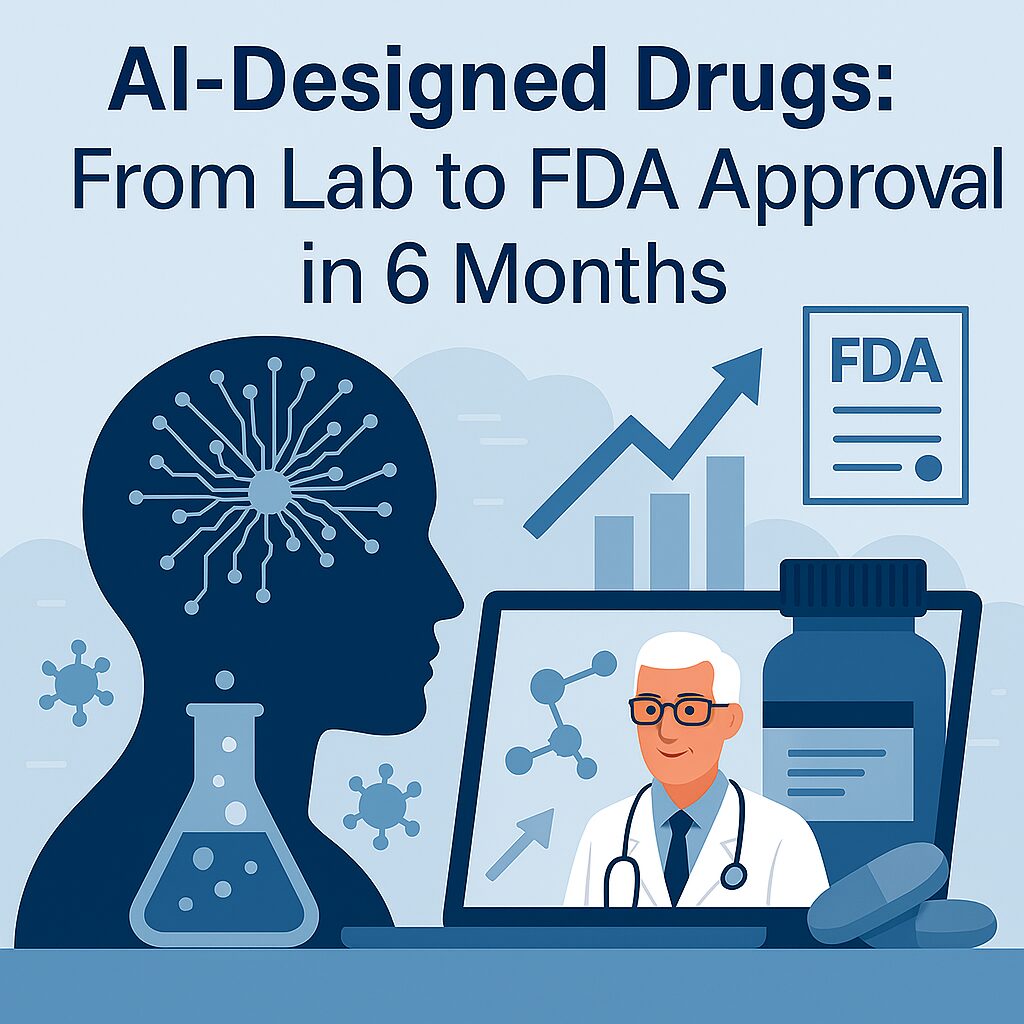Introduction
In 2025, the pharmaceutical world is undergoing a seismic shift. Thanks to AI-designed drugs, the journey from molecule discovery to FDA approval is no longer a decade-long marathon—it’s a sprint. With platforms like Exscientia, Insilico Medicine, and Synfini leading the charge, artificial intelligence is rewriting the rules of drug development.
🧠 What Are AI-Designed Drugs?
AI-designed drugs are therapeutic compounds created using machine learning algorithms that analyze vast datasets—genomic sequences, protein structures, clinical trial data—to identify promising drug candidates. These algorithms:
- Predict molecular interactions
- Optimize compound structures
- Simulate efficacy and toxicity
- Accelerate preclinical and clinical trial design
The result? Drugs that reach human trials in months, not years.
🚀 From Molecule to Market: The 6-Month Revolution
✅ Discovery Phase
AI platforms like GENTRL and AlphaFold generate novel molecules by scanning millions of chemical structures and predicting their biological activity.
✅ Preclinical Testing
Simulations replace lab experiments. AI models forecast toxicity, metabolism, and pharmacokinetics—reducing animal testing and lab time.
✅ Clinical Trial Design
AI tailors trial protocols using real-world data, improving patient selection and outcome prediction. This boosts trial success rates and shortens timelines.
✅ FDA Review
In 2025, the FDA’s generative AI system (cderGPT) now assists reviewers by automating repetitive tasks, cutting approval time from 6–10 months to mere days.
📊 Impact Table: Traditional vs. AI-Driven Drug Development
| Stage | Traditional Timeline | AI-Accelerated Timeline |
|---|---|---|
| Molecule Discovery | 2–3 years | 1–2 months |
| Preclinical Testing | 1–2 years | 3–6 months |
| Clinical Trials | 5–7 years | 1–2 years |
| FDA Approval | 6–10 months | 1–4 weeks |
🧪 Real-World Examples
- DSP-1181: Developed by Exscientia for OCD, reached Phase I trials in just 12 months
- INS018-055: Insilico Medicine’s anti-fibrotic drug, fully designed by AI, entered Phase II trials in 2023
- Synfini’s AI Cloud Foundry: Combines neuro-symbolic AI with robotic chemistry to fast-track drug synthesis
⚠️ Challenges and Ethical Considerations
Despite the speed, AI-designed drugs face hurdles:
- Data Transparency: FDA requires clear understanding of drug mechanisms—AI’s “black box” nature can complicate this
- Clinical Validation: AI predictions must be backed by rigorous human trials
- Regulatory Adaptation: Agencies must evolve to evaluate AI-generated therapies fairly
- Bias & Safety: Algorithms trained on biased data may overlook diverse populations
📈 SEO Tips for Drug Discovery Content Creators
✅ Search-Friendly Titles
- “AI Drug Discovery: FDA Approval in 6 Months”
- “How Artificial Intelligence Is Revolutionizing Pharma in 2025”
✅ High-Impact Keywords
- “AI drug design 2025”
- “FDA approval for AI-generated drugs”
- “machine learning in pharmaceutical R&D”
✅ Metadata Optimization
- Alt Text: “AI system designing molecular compounds for rapid drug approval”
- Tags: #AIPharma #DrugDiscovery2025 #FDAApprovalAI #GenerativeBiotech #MachineLearningMedicine
Conclusion
AI-designed drugs are not just speeding up science—they’re transforming lives. By compressing timelines, reducing costs, and enhancing precision, these algorithms are ushering in a new era of personalized, efficient, and scalable medicine.
💬 Want help crafting SEO-rich content on biotech breakthroughs, ethical AI in healthcare, or FDA trends? I’d love to collaborate—your narrative depth plus my data fluency could be a game-changer.

